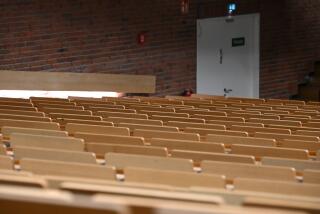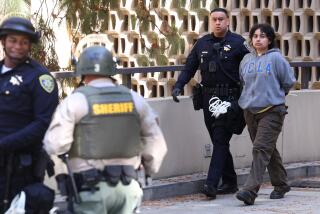‘Women and Peace’ Class Moves Students to Action
- Share via
CLAREMONT — All Prof. James Gould wanted was a fresh angle on peace.
Nobody could be more surprised, he said, now that the first semester of his “Women and Peace” class has ended with class members mobilized to educate all of Scripps College with a workshop on peace when school reopens in the fall.
What began as an intellectual inquiry by 15 freshmen developed into a commitment to feminist pacifism, a term many of the students said they considered distasteful when they enrolled in the class. Gould introduced the class in the spring semester at the small, women’s liberal arts college in Claremont in an effort to determine if women might be more effective than men in bringing about world peace.
“We started by asking if women really have a different perspective from men on war and peace--and if such a perspective might point the way toward a more peaceful world,” Gould said.
While some of the conclusions seemed sexist, Gould and the students said they were not intended that way. The problems are often caused by conditioning, not gender, they said.
As a 62-year-old scholar of international relations and teacher of another course on “Non-Violence in Theory and Practice,” Gould also wondered whether men are more biologically inclined to violence than women.
While no firm conclusions were reached about the battle of the sexes, the class members said they now believe that world peace is attainable if women take a stronger role.
Michelle Herman of Los Gatos was one of the students who said she was changed by the course.
“I did not consider myself a feminist, and I was not politically aware at all,” Herman said. But after researching feminism and pacifism, she theorized in a term paper entitled “A Piece of Political Power” that women must become peace activists.
“I’m going to organize the workshop--it’s up to people like me to do it,” she said.
Question to Ponder
One of the questions the class pondered was, “If women were given power, would they behave the way men do?” Gould said, “We don’t know, because we haven’t many women in power. If it’s a matter of socialization, could we socialize men to respond as women do?”
The 15 freshmen in the class mined sources in international relations, political science, literature, philosophy and history in search of answers.
“The class concluded that people are born essentially the same,” Gould said. Students thought that women who have achieved power in this century--including British Prime Minister Margaret Thatcher, former Israel Prime Minister Golda Meir and the late Indian Prime Minister Indira Ghandi--probably resorted to aggressive behavior because they adopted male behavior in order to rise to power.
Some of the students also concluded that because women have traditionally raised families, they more naturally tend to nurture and care for humanity. They perceived men as sharing the same feelings, but concealing them because of their more natural roles as aggressors.
“The world is violent because it’s run by a patriarchy, but it’s not hopeless,” said Jacqueline De Bernardo, who called her family background “very conservative.”
Marched in Protests
Since beginning the course, De Bernardo has marched in two protests against government aid to Nicaraguan rebels and she plans to take an active role in the workshop on non-violence.
“I never thought like this before,” said the freshman from Oxnard, echoing the sentiments of several classmates. “I thought the only way you could make it was to be like a man. Now I feel better as a woman--more confident.”
“That’s the surprise,” Gould said. “I’ve never had a class so anxious to carry out the work.”
“Fabulous. I can’t applaud them more,” said film producer Vivienne Verdon-Roe, whose documentary, “Women--For America, For the World,” is making its debut this month. In the film, a number of well-known women “speak out with good common sense, and a real sense of compassion and humanity,” Verdon-Roe said. This is the fourth anti-nuclear film produced by Verdon-Roe, a native of England who said she is in the process of becoming an American citizen. It was recently shown at the Nuart Theater in Los Angeles and will be seen on Atlanta station WTBS on Monday.
Verdon-Roe said that the conditioning that leads some men to block their emotions discourages some women from placing a high value on their more humanitarian feelings. “We feel our voices are not of value,” she said.
‘Pacifists Can Do More’
Before taking the class, a number of the students said they felt the same way.
“I think women realize more than ever how violent the world is, and that violence is increasing,” said Kerry Causey, a student from Irvine. “I know now that pacifists can do more with words and concepts and they’re stronger than those who favor war.
“I’m going to pursue peace research--I can make it happen in our time and it’s very exciting,” Causey said.
Kristina Petty of Portland, a practicing Catholic and aspiring biologist, said the class gave perspective to her faith and her concerns about war and oppression of women.
“What perpetuates war perpetuates poverty,” Petty said. “Jesus asked us to love the poor and our enemies. War is so opposite to those two things that I want to get rid of it more than ever. This class has changed my thinking and made me put things in perspective. Religion is basic to my life, and now I see that working for peace is an extension of that. And it’s linked with feminism, because I believe men are more inclined to support war than women.”
Focus of Career Goal
Reared in a feminist home, Anouchka Oppinger of Houston said, “I hadn’t thought about peace and violence so much, but now I see them both on a grand scale. I think I will eventually work in international relations and I’ll probably integrate these ideas into my work because now they’re very set in my mind.”
Gould said that when the Humanities Department at Scripps College asked him to propose and teach a new class for freshmen he chose “Women and Peace” in the hope of resolving some dilemmas posed by his course on non-violence, such as why the works on peace written by women have been largely ignored.
“I thought the whole area of women’s writing about peace was very much neglected,” he said. “That always bothered me. The classics on non-violence were those by men--(Nikolayevich) Tolstoy, (Mohandas) Gandhi and Martin Luther King Jr.--and you could see that women’s works were considered lesser works.”
He also wondered how students at a women’s college would react to a man teaching such a feminist class.
“I asked them about this several times and their answers were pretty consistent--they appreciated having the perspective of a man about this. They thought I might shed a critical light.”
Realization of Power
Gould said he “had no idea how it was going to turn out at all. Of course, I learned as much as the students did. I think what this did for me was to make me realize how much power we all have to achieve peace if we use these very human qualities of love, nurturing and caring.”
The students were not the only ones inspired to action by the course. Gould said he intends to write an article for publication “to see if I can get across some of these ideas to other men.”
The class was so well received by freshmen that Gould said he wants to teach another for upperclassmen.
“The new generation of women shows signs of being committed to achieving influence on their own terms, which means that we may soon see a world reformed by feminine values,” Gould said.
“And when you look around and see what a mess masculine values have made of the world, a change away from that almost has to be better.”
More to Read
Sign up for Essential California
The most important California stories and recommendations in your inbox every morning.
You may occasionally receive promotional content from the Los Angeles Times.










